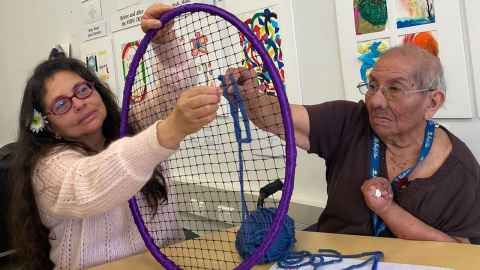Buen vivir builds collective well-being for older Latin American New Zealanders
4 December 2024
The concept of Buen vivir has helped older Latin Americans in Auckland to connect with their community, culture and the natural world.

Earlier this year a team of seven academics and experts launched research programme using the concept of buen vivir – a Spanish word meaning ‘good living’ and far more.
A grant of $10,000 from the University of Auckland Centre for Co-Created Ageing Research kick-started the project. Dr Diana Albarran Gonzalez, senior lecturer in design, is spokesperson for the research team. She grew up in Mexico and moved to Aotearoa 10 years ago.
Buen vivir informed her doctoral research and has been at the centre of many of her creative and research projects since she took up her role at the University in 2021. The concept of buen vivir stems from Indigenous Latin American philosophy and is fuelling social change. “Buen vivir is not just about individual wellbeing, it’s about collective wellbeing that comes from harmonious co-existence with nature and culture as a unity.
“It’s based on indigenous views that there’s no divide between nature and culture. Mountains are considered as living beings,” says Albarran Gonzalez.
After hundreds of years of colonisation and resistance in Latin America, a political movement emerged, using indigenous ideas of buen vivir to push back against capitalism’s relentless drive for growth at any cost. Buen vivir aims to inspire more holistic economic models, she says.
The concept was instrumental in changes to Ecuador’s constitution, which now reads: "We ... hereby decide to build a new form of public coexistence, in diversity and in harmony with nature, to achieve the good way of living."
The research group included about 20 Latin Americans, who already belonged to a club for those with “accumulated youth” (juventud acumulada) at Mano Amiga, a charity supporting Spanish speaking migrants in Auckland.
Many described feeling enriched by sessions the researchers held on ‘good living’ in relation to themes, such as good dreaming, good eating in a land full of different foods, connecting with nature, and living well with one’s physical body.
Craft is a big part of Latin American culture, and an abundant source of buen vivir. Albarran Gonzalez describes herself as a “craftivist” - a decolonial feminist who picks up threads passed down from her foremothers, delivering potent political messages through her craftwork. “When I go to meetings around the University, I’m crocheting and doing embroidery. For me, it’s embodied buen vivir,” she says.
Soon after the sessions started, it became clear isolation was a massive issue facing many older Latin Americans in Tāmaki Makaurau, Auckland, New Zealand’s biggest city.. The Latin Americans mostly speak Spanish, rather than English, making it harder to navigate a new land. “Many older Latin American migrants come to take care of their grandchildren, so they can be quite isolated. They don’t interact with many people, so language becomes a barrier for some," she says.
The researchers discovered that financial vulnerability is a major challenge facing many older Latin Americans in Auckland. The gap between rich and poor is extreme in many Latin American countries, so some migrants face financial hardship, and many are financially dependent on their adult children.
Participating in the group helped the older people overcome loneliness, while boosting their confidence and independence, she says. As part of exploring buen vivir in their own lives, the group learned Māori concepts, such as pepeha, which introduces a person through their connections to ancestors and to natural elements, such as maunga and awa. Now the Latin Americans are eager to branch out and share their own culture with New Zealanders.
The Latin American co-creators came up with numerous questions for future research. Albarran Gonzalez hopes to gain further funding to keep weaving buen vivir through Auckland’s older Latin American community.
Media contact: Rose Davis, rose.davis@auckland.ac.nz